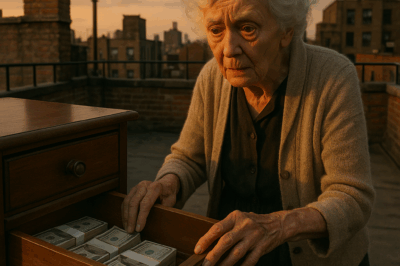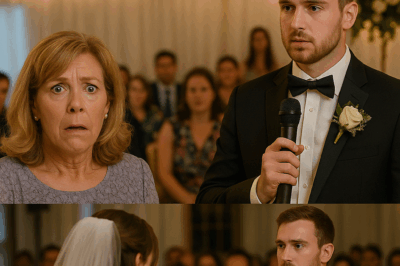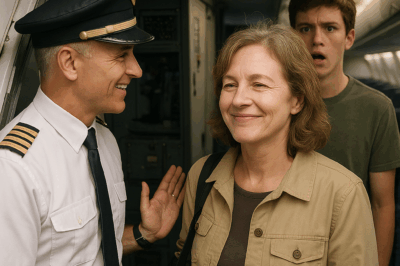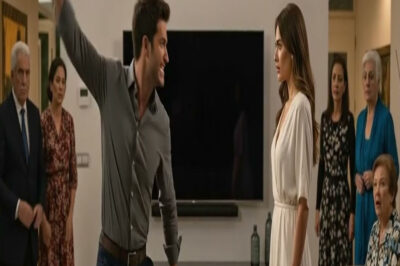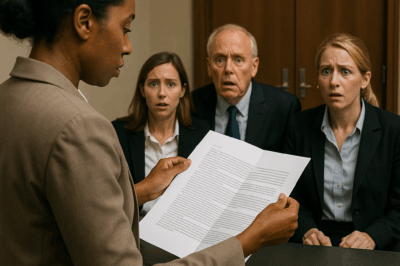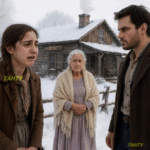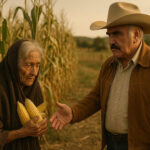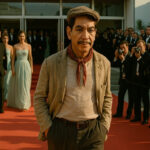What if a simple act of kindness, a daily gesture you thought no one noticed, was actually a test for Isabella Rossi, a 24year-old waitress drowning in debt and faded dreams. Kindness was all she had left to give. Her recipient was Arthur, a silent, grumpy old man who shuffled into her diner every morning a ghost at a corner booth.
She offered him a warm smile, a fresh coffee, and a small piece of her time, expecting nothing in return. She thought he was just another lonely soul. She had no idea he was guarding a secret worth billions a secret that was about to detonate her life. Because one rainy Tuesday, the diner door didn’t open for Arthur.
It opened for his lawyers, flanked by four stone-faced bodyguards, and they were there for her. The bell above the door of the morning glory diner was the soundtrack to Isabella Rossy’s life. It wasn’t a cheerful jingle. It was a tired metallic chime that announced the arrival of another customer needing coffee, another plate to carry another dollar to hopefully add to the tip jar.
The diner itself was a relic, a capsule of worn out vinyl boos, the color of dried mustard, a sticky lenolum floor, and a persistent aroma of burnt coffee and frying bacon. For Isabella, or Bella, as everyone called her, it was both her prison and her sanctuary. For the past 3 years, 6 days a week, from 5:30 a.m. to 3u p.m., Bella had danced the familiar ballet of the waitress.

She navigated the narrow aisles with a grace born of repetition, balancing plates on her arm, refilling coffee cups without spilling a drop, and manufacturing a smile that often felt as cracked as the porcelain mugs she washed by hand. her real passion. Her soul was locked away in a tiny secondf flooror apartment a few blocks away, gathering dust on canvases she could no longer afford.
Art school had become a distant dream, buried under a mountain of her mother’s medical bills and the crushing weight of rent. Her regulars were a predictable cast of characters. There was Frank, the construction foreman, who read the sports page and left exactly a $1 tip regardless of his bill.
There were the two chatty secretaries from the law office down the street who dissected their boss’s love life over wilted salads. And then there was Arthur. Arthur was different. He wasn’t a regular in the traditional sense. He was a fixture as much a part of the diner as the humming neon sign out front. Every single mo
rning at precisely 7:15 a.m. he would push open the heavy glass door and shuffle to booth 4, the one in the back corner by the window. He never made eye contact with anyone. He wore the same outfit, a faded tweed coat, no matter the weatherworn trousers and scuffed leather shoes. His face was a road map of wrinkles, his eyes a pale watery blue that seemed to look right through everything. He was a whisper in a loud room.
The first time he came in, Bella’s boss, a perpetually stressed man named S, had warned her. Don’t bother with the old coot in four. He doesn’t talk. Just give him black coffee and the daily special, whatever it is. He’ll pay an exact change and leave. Brenda, the veteran waitress who had the patience of a wasp, sneered. Waste of a fortop.
We should stick him at the counter. But Bella saw something else in his stoic silence. She saw a profound loneliness, a quiet dignity that touched the artist’s heart still beating within her. So she ignored Hall’s advice. The first day, she placed the menu in front of him. Good morning, sir. My name is Bella.
Can I start you with some coffee? He just grunted, not looking up. She poured the coffee anyway. When she brought the special, a greasy plate of eggs and sausage. She noticed his hands trembled slightly as he reached for the salt. The next day she did the same, and the next. For a week he met her cheerful greetings with silence.
But Bella was persistent. The toast looks extra good today, she’d say. Or there’s a bit of a chill out there. This coffee should warm you right up. Then one Monday morning, about a month into his silent patronage, as she set down his plate, she noticed him struggling to cut his toast with the diner’s dull knives. His knuckles were swollen with arthritis.
Without a second thought, she picked up the knife. “Allow me,” she said gently. She cut his toast into four perfect, manageable squares. For the first time, Arthur looked up. His watery blue eyes met hers, and for a fleeting second she saw a flicker of surprise, maybe even gratitude. He gave a short, sharp nod, then looked back at his plate. It was a victory. From that day forward, it became their ritual.
She’d bring his coffee, black. She’d bring him the daily special, and she would always cut his toast. Sometimes she’d talk to him, filling the silence with little stories about her day, the funny thing a customer said, or her dream of one day visiting the Louvre in Paris to see the masterpieces in person.
He never responded, but she felt he was listening. He would occasionally leave an extra quarter on the table, a silent acknowledgement that felt more valuable to her than a $20 tip. Her co-workers teased her relentlessly. Still talking to your boyfriend, Bella. Brenda would mock, wiping down the counter with a sour look. You’re wasting your breath. He’s probably deaf.
Leave her alone, S would grumble from behind the grill. If she wants to talk to a brick wall, let her. At least he doesn’t complain. Bella didn’t care. Those 10 minutes every morning became a strange anchor in her chaotic life. In a world that demanded everything from her and gave little in return, this small one-sided connection felt pure.
It was a simple act of service, a moment of quiet communion. She wasn’t doing it for a bigger tip or for praise. She was doing it because when she looked at the lonely old man in booth four, she saw a human being who deserved a little bit of warmth, even if he couldn’t or wouldn’t ask for it. She had no idea that her simple kindness was being observed, cataloged, and judged by a mind sharper than anyone in the morning glory diner could possibly imagine.
The Tuesday started like any other. The air was thick with the smell of rain and sizzling bacon. Bella was running on 4 hours of sleep, having spent most of the night on the phone with a nurse at her mother’s care facility, discussing medication changes and mounting bills. She felt a familiar knot of anxiety tighten in her stomach, but she pushed it down, pinning her professional smile in place as she tied her apron. 7:15 a.m. came and went.
Booth four remained empty. Bella glanced at the clock, then at the door, a small furrow in her brow. Arthur was never late. Never. He was as reliable as the sunrise. By 7:30, a tendril of genuine concern began to creep into her thoughts. Maybe he was sick. He was old, after all. She made a mental note to ask the other regulars if they knew where he lived, though she doubted anyone did.
He was an island. At 8:05, the bell above the door chimed, but it wasn’t Arthur. The entire diner fell silent. Even the sizzle from S’s grill seemed to hush. Four men, all built like refrigerators and dressed in immaculate black suits with earpieces stepped inside.
They moved with a fluid, disciplined precision that was utterly alien to the sticky, flawed diner. Two flanked the door, their eyes scanning the room with unnerving stillness. The other two stepped aside to allow a fifth man to enter. He was older, perhaps in his late 60s, with silver hair swept back from a high forehead and a face that was all sharp angles and intelligent eyes.
He wore a tailored charcoal gray suit that probably cost more than Bella earned in a year. In his hand, he carried a pristine leather briefcase. He looked around the diner, his expression a mixture of mild distaste and focused purpose. Can I help you?” S asked, wiping his greasy hands on his apron, his usual bluster completely gone. The man in the charcoal suit ignored him.
His gaze swept the room until it landed on Bella, who was standing frozen by the coffee machine, a pot still in her hand. He walked directly toward her, his expensive Italian shoes making soft, decisive sounds on the lenolium. The two bodyguards followed a few paces behind their presence, sucking the very air out of the room.
“Are you Miss Isabella Rossy?” the man asked. His voice was calm, deep, and carried an authority that demanded an answer. Bella’s heart hammered against her ribs. She could only nod her throat suddenly dry. What was this? Was she in some kind of trouble? Did she witness something? Was this about her mother’s bills? The man stopped in front of her.
He gave her a long appraising look. My name is Marcus Davies. I am a senior partner at the law firm of Sterling Cromwell and Davies. I was the personal attorney for Mu Mr. Arthur Pendleton. The name hung in the air. Pendleton. It sounded so formal, so important. It took Bella a moment to connect it to the quiet old man in booth 4. Arthur.
His name was Arthur Pendleton. Arthur, she whispered. Is he okay? He didn’t come in this morning. Mr. Davies’s expression softened almost imperceptibly. Mr. Pendleton passed away peacefully in his sleep late last night. The coffee pot suddenly felt immensely heavy in Bella’s hand. A wave of unexpected grief washed over her. It was absurd.
She barely knew him. He never said a word to her, but their silent ritual had become a part of her life, a small steady point in her turbulent world. Now it was gone. Tears pricricked at the back of her eyes. “Oh,” she said, her voice small. “I’m I’m so sorry to hear that.
” Brenda was watching from the counter, her mouth a gape. Frank had lowered his newspaper. The entire diner was wrapped silent, witnesses to a drama they didn’t understand. Mr. Davies nodded curtly, as if acknowledging a required pleasantry. Mr. Pendleton was a very specific man with very specific instructions.
His final will and testament contains a provision that requires your immediate presence. If you would be so kind as to gather your things, a car is waiting outside to take us to my office for the reading. Bella stared at him, bewildered. Bewill me. I think you have the wrong person. I just I just served him coffee. There is no mistake, Ms. Rosie Davies, said his voice firm, but not unkind.
Mr. Pendleton was quite clear. Your name is Isabella Rossi. You are a waitress at this establishment. And for the past year and a half, you have cut his toast into four equal squares every morning without fail and without ever being asked. The detail was so specific, so mundane that it stunned Bella into silence. He had noticed.
Not only had he noticed, but he had told his lawyer about it. “Sal,” she said, turning to her boss, who was looking pale and confused. “I I don’t know what this is.” “Go,” Sal grunted, finding his voice. “Go on,” Brenda covered her tables. Brenda shot Bella a look of pure venomous envy, but didn’t dare argue. numbly, Bella untied her apron, her hands shaking.
She placed it on the counter, grabbed her worn satchel from the breakroom, and walked back out into the diner. The four bodyguards and the lawyer, formed a protective circle around her, creating a bizarre bubble of wealth and power in the humble diner as they escorted her out the door, leaving the entire Cleonel speechless. Bella felt a dizzying sense of unreality. The cold, damp air hit her face.
A sleek black town car, a Lincoln Continental, was idling at the curb, its engine a low purr. One of the bodyguards opened the door for her. As she slid on to the plush leather seat, a seat more luxurious than any piece of furniture she owned, she looked back at the morning glory diner. It looked small and sat under the gray sky.
She had a terrifying, electrifying feeling that she would never see it the same way again. The ritual was over. Something new and infinitely more complicated was just beginning. The ride to the law office was a silent, surreal journey through the city. Bella stared out the tinted windows at the familiar streets which now looked alien and distant.
The car was an oasis of quiet luxury, smelling of leather and polish. Mr. Davies sat opposite her reviewing documents from his briefcase, his face an unreadable mask of professionalism. Bella’s mind was a whirlwind of confusion and a dull, aching sadness for the old man she never truly knew.
The offices of Sterling Cromwell and Davies were located in the penthouse of a gleaming skyscraper in the heart of the financial district. It was a world away from the morning glory diner. Marble floors, towering glass walls with panoramic city views, and hushed art-filled corridors greeted them. Bella, in her faded jeans and worn out sneakers, felt like a stray cat that had wandered into a palace.
She was led into a vast boardroom dominated by a long, polished mahogany table. At one end sat two people who looked as out of place as Bella felt, though for different reasons. They radiated an aura of impatient resentful privilege. The man was in his late 20s with sllickedback hair, a designer suit that looked a little too tight, and a petulent scowl.
The woman beside him, presumably his mother, was impeccably dressed, her face, a carefully constructed mask of polite disdain, her fingers drumming impatiently on the table. Mr. Davies cleared his throat as they entered. Miss Diana Pendleton, Mr. Caleb Pendleton. This is Miss Isabella Rossy. Caleb Pendleton’s eyes swept over Bella in a single dismissive glance, a snear twisting his lips.
This is who we’ve been waiting for. A waitress grandfather’s gone scenile after all. Caleb, please. his mother,” chided, though there was no real heat in her words. Her gaze on Bella was just as cold. “Miss Rosie, please have a seat,” Mr. Davies said, gesturing to a chair far down the table from the Pendletons.
The distance felt intentional, a chasm between two different worlds. Bella sat her hands clenched in her lap. The bodyguards stood impassively against the far wall. The tension in the room was thick enough to cut with a knife. Now that all parties mentioned in the primary cordil are present, we can begin. Davies announced opening a thick leatherbound document.
He put on a pair of reading glasses and began to read in a dry, emotionless monotone. Most of it was legal jargon that flew right over Bella’s head. Trusts endowments to charities she’d never heard of. Bequests to foundations. She listened to the staggering sums being discussed, numbers that felt more like concepts than actual money. The Pendleton fortune was clearly immense.
Then Davies paused and looked directly at Diana and Caleb. to my daughter-in-law Diana Pendleton and my grandson Caleb Pendleton. I leave the contents of the Pendleton family trust as contractually obligated by pre-existing family arrangements. This amounts to a principal sum of $10 million each. Caleb scoffed loudly. 10 million? That’s it. That’s an insult.
The company is worth billions. Your grandfather liquidated the majority of his personal assets over the last 2 years. Caleb Davies said coolly. What he does with his personal fortune is and was his own prerogative. He owed it to us. We’re his family. Diana snapped her polite facade cracking. Davies ignored them and continued reading.
All remaining personal effects properties and the controlling interest in the Pendleton Global Holding Company are to be dealt with as follows. He took a breath. To my friend and physician, Dr. Alistair Finch, I leave the sum of $1 million. He turned a page.
Bella held her breath, not knowing why she was even here. Maybe Arthur had left her a small token, a few hundred as a final silent tip. That would be more than enough, a kind gesture from a quiet man. And now Davies said, looking over his glasses directly at Bella, his voice resonating in the silent room. We come to the final provision.
He read from the will to Miss Isabella Rossi, the young woman at the Morning Glory Diner, who showed an old man kindness when she had no reason to, who treated him with dignity when others saw only a nuisance, and who without fail cut his toast, because she noticed his hands trembled. Bella’s eyes filled with tears. He had noticed everything. Davies continued. To Ms.
Rosie, I leave a legacy of kindness returned. First, I bequeath to her the sum of $250,000 to be transferred to her account immediately to ease her burdens as she once eased mine.” Bella gasped. The room tilted. $250,000,000. It was more money than she had ever imagined holding. It would pay for her mother’s care for years.
It would clear her debts. It was a miracle. What Caleb exploded, leaping to his feet. He’s giving a quarter of a million dollars to a hash slinger. We’ll contest this. He was clearly not of sound mind. Please sit down, Mr. Pendleton. Davis said, his voice dropping to an icy calm. I am not finished. Caleb stared, then slowly sank back into his chair, his face flushed with rage.
Davies adjusted his glasses and read the final sentence. And finally, because it was the last place on earth where I felt seen, not as a source of wealth, but as a human being, I leave her the one thing that brought me a small measure of peace in my final years.
I bequeath to Miss Isabella Rossi in its entirety the property and business known as the Morning Glory Diner, located at 152nd Street and Elm, which I purchased 6 months ago through a subsidiary company. Silence. A thick, profound silence filled the boardroom. Bella just stared her mind, unable to process the words. the diner. He bought the diner for her. Then Caleb started to laugh. It wasn’t a happy sound.
It was a sharp, ugly, incredulous bark. The diner. He leaves her a greasy spoon. Oh, that’s rich. After all that buildup, he leaves the waitress her own cage. Grandfather really did have a twisted sense of humor. But Mr. Davies wasn’t smiling. He closed the will, removed his glasses, and looked at Bella with an expression she couldn’t quite decipher.
It was a mix of pity, respect, and warning. “There is one more thing, Ms. Rosie,” he said, his voice low. “Included with the diner is the small investment portfolio, Mr. Pendleton attached to the business to ensure its long-term viability and provide for capital improvements. It is currently valued at approximately $5 million. The laughter died in Caleb’s throat.
His face went from red to a sickly pale white. Diana’s perfectly manicured hand flew to her mouth. Bella felt the floor drop out from under her. $5 million. The diner. It wasn’t a cage. It was a kingdom. The grumpy, silent old man. She had served coffee to the man she felt sorry for. Wasn’t just wealthy. He was Arthur Pendleton, founder of Pendleton Global, a corporate titan, a king of industry who had hidden in plain sight.
And he had just handed her a broke art student slinging hash in a greasy spoon the keys to a new life. A life that, judging by the murderous look in Caleb Pendleton’s eyes, was about to become very, very dangerous. Leaving the law office was like stepping out of a hyperbaric chamber and into a hurricane. The bodyguards escorted Bella back to the Lincoln Continental, shielding her from the furious, sputtering insults of Caleb Pendleton, who had followed them into the hallway. This isn’t over, you little gold digger.
He seethed his face contorted with rage. I’ll have my lawyers crawl over every inch of this. You won’t see a dime. Bella didn’t respond. She was in a state of profound shock, her mind numbly replaying Mr. Davies’s words. $5 million. The diner is yours. Mr. Davies had given her his card and a thick folder of documents. A financial adviser will call you tomorrow, Ms.
Rosie. Do not speak to anyone, especially the Pendletons. If they contact you, you call me immediately. Arthur, Miss Pendleton anticipated their reaction. The car dropped her off in front of her run-down apartment building. The contrast was jarring. One moment she was in a world of mahogany and billions.
The next she was climbing the creaky, dusty stairs to her tiny apartment. She unlocked the door and stepped inside the folder clutched to her chest like a life raft. Canvases were stacked against the wall. Her easel stood empty in the corner, a silent testament to a life deferred.
The first thing she did was call her mother’s care facility. With a trembling voice, she spoke to the financial administrator and paid the entire outstanding balance, then paid for the next 2 years in advance, requesting a private room and the best possible care for her mother. The relief that washed over her was so immense it brought her to her knees.
She sat on her floor and wept, not for sadness, but for the sudden crushing release of a burden she had carried for so long. The next morning, Bella didn’t go to the diner. She couldn’t. What would she say? How could she walk in there? Instead, she went to the bank with a cashier’s check for $250,000 that Mr. Davies had prepared for her.
The bank manager, who usually treated her with polite indifference, ushered her into his private office with a newfound sickopantic respect. The world had already begun to shift around her. By the afternoon, she knew she couldn’t hide forever. She had to face them. Taking a deep breath, she walked the familiar blocks to the morning glory diner. It was the middle of the lunch rush.
Through the window, she could see Brenda looking hassled and S sweating over the grill. She pushed open the door. The little bell chimed. Every head turned. Conversations stopped. S looked up from the grill spatula in hand. Brenda holding a tray of burgers froze midstride. They had all heard. The gossip from Frank who had witnessed the lawyer’s arrival must have spread like wildfire.
Bella Sal said his voice uncertain. Hi S, she said her voice surprisingly steady. She walked up to the counter. I I guess you’ve heard. Heard you came into some money, Brenda said, setting her tray down with a thud. There was a sharp, envious edge to her voice. Decided you’re too good to show up for your shift, huh? Brenda, S warned. No, it’s okay, Bella said.
She looked from S to Brenda, then to the other staff, peeking out from the kitchen. These people had been her world. It’s true, Arthur. Mr. Pendleton, he left me some money. And he left me the diner. A collective gasp went through the staff. S’s spatula clattered onto the grill. He what? Suttered. I own this diner. I’ve owned it for 30 years. Bella’s heart sank.
This was the part Mr. Davies had warned her about. She opened the folder and pulled out a document. According to this, S, you sold the diner 6 months ago to a company called AP Holdings. You’ve been operating as a salaried manager since then. Sared, his face turning ashen. AP Holdings.
They offered me a fortune, more than this place was worth. I thought I thought it was some big real estate developer who was going to tear it down. I never thought he sank onto a stool looking utterly defeated. So, I’ve been working for the old man all this time. And now I work for you. The absurdity of the situation hit everyone at once.
Isabella Rossy, the quiet waitress who was constantly getting her hours cut, was now their boss. Brenda let out a short, bitter laugh. Well, isn’t this a fairy tale? So what now, boss? Are you going to fire us all and hire your friends? The challenge hung in the air? This was her first test. Every eye was on her. She could feel the resentment, the disbelief, the fear. Her old life was gone. She was no longer one of them.
She was the owner, the other. Bella took a deep breath, pushing aside her own shock and fear. She thought of Arthur of his quiet dignity. What would he have wanted? No one is getting fired, she said, her voice clear and firm, surprising even herself. Nothing is changing right now. S, you’re the best grill cook in the city.
Brenda, you can handle a six table rush without breaking a sweat. This place runs because of you. I don’t know the first thing about running a business. I I’m going to need your help. Her honesty seemed to deflate some of the tension. S looked up, a glimmer of hope in his eyes. Brenda just scowlled, unconvinced. “So, what’s your big plan?” Brenda challenged.
“Are you going to start serving champagne and caviar?” “No,” Bella said, a small smile, touching her lips for the first time. “But I am going to buy a new coffee machine and a knife sharpener, and we are going to fix the air conditioning.” It was the right thing to say. A few of the kitchen staff chuckled. These were their daily complaints, the small miseries of their job.
Hearing them acknowledged by the new owner, their former coworker, meant something. Just then the bell on the door chimed again. A man in a messenger uniform stood there. Package for Isabella Rossy. He handed her a slim, elegant box from the Sterling Cromwell and Davies Law Firm. Puzzled Bella signed for it and opened it.
Inside, nestled on a bed of velvet, was a single old-fashioned brass key and a handwritten note on heavy cream colored stationery. The handwriting was shaky, but clear. It was from Arthur. My dear Isabella, it began. If you are reading this, then the world knows my secret and you have received my gift. The money is for your freedom. The diner is for your heart.
This key is for your future. It opens my private study. Marcus knows where. Go there. Understand? Why? An old man’s final request. AP a key, a secret study. Bella looked up from the note, her mind racing. The inheritance wasn’t just money and a building. It was a mystery. And as she looked at the resentful faces of her new employees, and thought of Caleb Pendleton’s venomous threats, she realized she would have to solve it if she was ever going to truly claim her new life. The address Mr. Davies gave Bella for Arthur’s private residence was
on Park Avenue. It was one of those pre-war limestone buildings with a canopied entrance and a doorman who looked like a retired general. When the taxi pulled up, Bella felt a fresh wave of intimidation. She was wearing the nicest clothes she owned, a simple black dress she’d bought at a thrift store, but she still felt like an import Mr. Davies was waiting for her in the lobby. His expression was somber.
“He hasn’t allowed anyone into his personal apartment in over a decade,” he explained as they rode a silent woodpanled elevator to the penthouse. “Not even his family. He conducted all his business from his corporate headquarters. This was his sanctuary.” The elevator opened directly into the apartment. Bella stepped out and forgot to breathe.
It was vast with floor to-seeiling windows offering a breathtaking view of Central Park. But it wasn’t the view or the scale of the place that stunned her. It was the art. The walls were covered with masterpieces. A monet hung over the fireplace, its waterlies shimmering in the afternoon light. A dear sculpture of a dancer sat on a pedestal.
A small, intense Van Go self-portrait stared out from a side wall. It was a private museum curated with impeccable taste. He was one of the world’s most discrete art collectors,” Davies said softly, observing her reaction. “This is what Caleb was truly after. This collection is priceless.” The apartment was immaculate, yet it felt profoundly lonely.
There were no family photos, no clutter, just priceless art and elegant sterile furniture. It felt like a gilded cage. The study is this way, Davies said, leading her down a long hall. He stopped at a heavy oak door. He gave me a sealed envelope with a key for myself with instructions to open it only upon his death to grant you access.
I will wait for you out here. Bella’s hand trembled as she inserted the brass key Arthur had left her. It turned with a satisfying click. She pushed the door open and stepped inside. The study was completely different from the rest of the apartment. It was warm and lived in.
Books crammed every shelf from classic literature to modern physics. A large worn leather armchair sat beside a fireplace. A faint scent of old paper and pipe tobacco lingered in the air. But what dominated the room was the wall behind the massive desk. It wasn’t covered in art. It was a corkboard stretching from floor to ceiling, covered in a complex web of photographs, stock charts, legal documents, and handwritten notes connected by colored strings.
It was the strategic map of a general commanding a global empire. This was the real Arthur Pendleton. At the very center of this web, however, was something that didn’t fit. It was a small, slightly blurry photograph. Bella stepped closer. It was a picture of a woman laughing sitting on a checkered blanket in a park.
She was beautiful with kind eyes and a warm smile. Next to it was another photo. This one of the same woman standing proudly in front of a small charming storefront. The sign above the door read, “Ellanena’s eats.” Bella’s eyes were then drawn to a series of newspaper clippings yellowed with age. The headlines told a tragic story. Promising restorator Eleanor Pendleton dies in car accident.
Corporate raider Harrison Vance acquires bankrupt restaurant chain. Pendleton Global announces hostile takeover of Vance Industries. It all started to click into place. Elellanena must have been his wife. She was a restaurant tour, a creator of simple places for people to eat. She had been killed and a corporate predator named Vance had seemingly profited from her death only to be crushed years later by a venge Arthur.
Drawn by a name, she looked at a different section of the board. It was dedicated to Caleb. There were photos of him on yachts in nightclubs with a string of models. There were financial reports showing massive losses from a tech startup he’d founded with his grandfather’s money.
There were copies of checks Arthur had written to pay off Caleb’s gambling debts. One note in Arthur’s shaky hand read, “He has her name, but none of her heart.” Finally, her eyes found a small empty space on the board. Tacked to it was a single recent photo. It was a candid shot taken from a distance of Bella herself.
She was outside the Morning Glory diner on her break, smiling at something on her phone. Pinned next to it was a small handwritten note. She has her heart. Tears streamed down Bella’s face. It was never about the toast. Not really. He wasn’t testing her kindness. He was looking for a reflection of his lost wife, Elellanena. He was searching for someone with a good heart, someone who understood that the value of a place wasn’t in its price tag, but in the warmth and dignity it offered.
The diner wasn’t just any diner. It reminded him of his wife’s dream. In leaving it to Bella, he wasn’t just giving her a gift. He was entrusting her with Elellanena’s legacy. Suddenly, a new determination hardened her grief. This wasn’t just about money anymore. It was about honoring the faith of a lonely old man who had lost everything that truly mattered to him.
Caleb didn’t just want the money. He wanted to destroy the last thing his grandfather had built. The one thing Arthur believed was a worthy legacy. She walked over to the desk. On it was a single sealed envelope addressed to her. She opened it. Inside was a letter and a stock certificate for a single share of Pendleton Global.
The letter read, “Isabella, knowledge is power. This single share gives you the legal right to attend the annual shareholder meeting next month. Caleb will be there. He will try to seize control of the board. He thinks you are a nobody. Prove him wrong. Everything you need is in this room. Your friend Arthur.
Bella looked around the study at the web of power at the story of love, loss, and revenge. It was a complete dossier on the Pendleton Empire and its enemies. Arthur hadn’t just given her a diner and a fortune. He had given her an arsenal. The war with Caleb Pendleton was coming, and Arthur had just armed his most unlikely soldier for the fight of her life.
The following weeks were a blur of transformation for Bella. She spent her days at the diner and her nights in Arthur’s study. Mr. Davies had arranged for her to have unlimited discrete access to the penthouse. The bodyguards now on her payroll would drive her there after her shift at the diner.
At first, her presence at the morning glory was awkward. She tried to fall back into her old role, refilling coffees and taking orders, but S and the others wouldn’t let her. “You’re the owner now, Bella,” S said gently, taking a coffee pot from her hand one afternoon. “You should be in the office looking at the books. let us handle this. He was right.
She retreated to the tiny cluttered back office and began to learn. With the help of the financial adviser Arthur had arranged, she started to understand profit margins, supply chains, and payroll. The $5 million portfolio wasn’t just a lump sum. It was a carefully managed fund designed to generate steady income, more than enough to cover the diner’s expenses and a handsome salary for her.
She gave the entire staff a raise, starting with S and Brenda. Brenda, who had been her harshest critic, was the most resistant to the change. She watched Bella with suspicion, as if waiting for the other shoe to drop. The turning point came one sweltering afternoon when the ancient air conditioner finally died with a groan and a puff of smoke.
“The kitchen became an inferno.” “That’s it. I quit,” Brenda announced, throwing her apron down. “I’m not working in a sauna.” The old Bella would have pleaded with her. The new Bella nodded. “You’re right,” she said calmly. “It’s unacceptable.” She got on the phone.
Within 2 hours, a team of technicians was there installing a brand new top-of-the-line commercial air conditioning system. She paid for the emergency installation without blinking. The next day, the diner was cool and comfortable. Brenda came back to work, didn’t say a word, but started calling her boss, and for the first time, it didn’t sound like an insult. Bella had earned a sliver of respect, not with words, but with action.
Her nights were spent in a different world. In Arthur’s study, she became a student of power. With Mr. Davis as her reluctant tutor, she began to unravel the complex web on the corkboard. She learned about shell corporations, leveraged buyouts, and proxy battles. She read Arthur’s private journals filled with his observations on business life and his profound unending grief for Elellanena.
She learned about Caleb’s recklessness, his failed ventures funded by his grandfather, and his deep-seated resentment. She discovered Arthur’s master stroke. In his final years, he had been systematically breaking up pieces of Pendleton Global, making the core company leaner, but also more vulnerable. He had converted most of his personal fortune into a series of anonymous charitable foundations.
Caleb’s inheritance was intentionally capped. Arthur had starved his grandson of the resources needed for an easy corporate takeover. Caleb thought he was inheriting a kingdom. Arthur had left him a battlefield with a depleted army. The one thing Caleb did have was the support of a few key board members who were loyal to his father and saw him as the rightful heir.
His plan, as pieced together from Arthur’s notes, was clear. At the upcoming annual shareholder meeting, he would call for a vote of no confidence in the current CEO, a loyalist appointed by Arthur, and use his family name and the support of his allies to get himself installed as chairman. He can’t win outright, Mr.
Davies explained one evening, pointing to a chart of major shareholders. But he can cause chaos. He can spook the investors, drive the stock price down, and try to force a sale to a rival corporation who will install him as a puppet leader. His ego won’t accept anything less than total control, even if it means burning the empire to the ground.
“So, how do we stop him?” Bella asked, looking at the single share certificate on the desk. It seemed so insignificant. We use the one thing Arthur left you the truth. Davies said that single share gives you the right to be in that room and the right to speak to the shareholders. We can’t outvote him, but perhaps we can outmaneuver him.
Working late into the night, they formulated a plan. It was audacious, terrifying, and relied entirely on Bella’s ability to step onto the biggest stage of her life and convince a room full of sharks that a waitress from a greasy spoon knew better than the heir to the Pendleton fortune. The day of the shareholder meeting arrived.
Bella stood in front of the fulllength mirror in Arthur’s penthouse bedroom. She wasn’t wearing a thrift store dress. Mr. Davies had insisted she use a personal shopper. She was wearing a simple but impeccably tailored navy blue suit. Her hair was pulled back in a neat bun. She looked professional, calm, and confident, but inside her heart was a trapped bird. “You’re ready,” Mr. Davies said from the doorway.
He looked at her, and for the first time she saw a genuine smile on his face. Arthur would be proud. Two of her bodyguards escorted her. As she walked through the gleaming lobby of the Pendleton Global Tower, she saw him. Caleb was standing with his allies laughing, oozing arrogance. He saw her, and his face froze, his expression shifting from shock to contemptuous amusement.
“Well, well, look what the cat dragged in,” he said loud enough for everyone to hear. Come to serve coffee, sweetheart. His cronies snickered. Bella didn’t rise to the bait. She met his gaze, her expression unreadable. I’m a shareholder, Caleb, she said, her voice clear and steady. And I have a right to be here.
She walked past him, head held high and into the lion’s den, leaving him momentarily speechless. The battle had begun. The boardroom was an amphitheater of corporate power. A massive U-shaped table was filled with the board of directors, men and women with severe faces, and expensive suits. Tears of seats behind them were filled with major shareholders, analysts, and media. Bella, guided by Mr.
Davies, took a seat in the front row reserved for shareholders. She felt a hundred pairs of eyes on her, whispering, questioning her presence. The meeting began with dry presentations and financial reports. Bella listened, her hands clasped tightly in her lap. Then the chairman opened the floor for new business. Caleb immediately stood up.
He was a natural performer, charming and confident. He spoke of legacy of his family’s name and of a bold new vision for the future. He painted the current leadership as stagnant and unimaginative. My grandfather was a legend. He boomed, but his time has passed. Pendleton Global needs new blood, a new direction to compete in the 21st century. It needs a Pendleton at the helm.
He then formally made his motion, a vote of no confidence in the CEO, and the nomination of himself, Caleb Pendleton, as the new chairman of the board. A tense murmur went through the room. Caleb’s allies on the board, voiced their support. It was clear he had momentum.
The CEO, a capable but uncarismatic man named George Riley, offered a weak defense that was quickly shot down. Is there anyone else who wishes to speak on this motion before we call the vote? The chairman asked, his gaze sweeping the room. This was it. With a silent nod from Mr. Davies, Bella stood up. A wave of confused whispers rippled through the audience. Who is she? What is she doing? Caleb smirked.
I believe the floor is for shareholders, not the catering staff. I am a shareholder, Bella said, her voice amplified by the microphone at her seat. It trembled slightly at first, then found its strength. “My name is Isabella Rossy.” She didn’t look at Caleb. She looked at the faces of the board members, the investors. Mr.
Pendleton speaks of his grandfather’s legacy. I’m here today because I too was a part of Arthur Pendleton’s legacy. Not the legacy of billions of dollars and corporate takeovers, but the legacy of his final years. She told them her story. She didn’t embellish it. She spoke simply and honestly about the morning glory diner, about the quiet old man in booth 4, about cutting his toast because his hands shook.
The room, initially dismissive, grew quiet, listening intently. You see, in his final years, Arthur Pendleton wasn’t interested in acquiring more companies. He was interested in one thing, character. He spent his days in a simple diner watching people. He wasn’t looking for the next great CEO. He was looking for simple honest decency.
She then turned her attention to Caleb. Caleb Pendleton talks about a bold new vision. Arthur Pendleton’s private records, which he left in my care, show Caleb’s vision quite clearly. Mr. Davies stood and placed a file in front of the chairman. “Copies for the board,” he said grimly.
Bella continued her voice ringing with conviction. A vision that led to a $30 million loss on a failed tech venture. A vision that required his grandfather to pay off over $2 million in personal gambling debts. A vision of such recklessness that Arthur Pendleton in his own handwriting wrote, “My grandson has the ambition of a king, but the judgment of a fool.
” He didn’t leave his empire to Caleb, not out of spite, but out of a fiduciary duty to protect it from the one person he knew would destroy it. Gasps echoed through the room. Caleb’s face had turned a blotchy, furious red. These are lies. Slander, are they? Bella challenged her gaze unwavering. The documentation is all there.
Arthur Pendleton saw that the heart of this company wasn’t its stock price, but its integrity, an idea his grandson has never understood. She then played her final card. But I’m not here to ask you to believe me or to simply reject Caleb. I’m here to honor Arthur’s true final vision. He didn’t want another king on the throne. He wanted stewardship. She looked directly at George Riley, the belleaguered CEO.
He left notes praising Mr. Riley’s caution, his stability, his loyalty. He believed in him. but he also knew the company needed a soul. She turned back to the board. Therefore, as a shareholder, I propose an amendment to the company’s charter, the creation of the Pendleton Legacy Foundation to be funded by 10% of the company’s annual profits dedicated to supporting small businesses and funding educational scholarships.
and I nominate myself Isabella Rossi, owner of the Morning Glory Diner and Arthur Pendleton’s chosen heir to run it. It was a master stroke. She wasn’t asking for power over the company, but for a position of moral authority within it. She had tied Arthur’s personal legacy directly to the company’s future, offering the shareholders a story of redemption and purpose instead of a grubby power struggle.
She had honored the stable CEO while simultaneously sidelining Caleb, not with corporate tactics, but with a simple, powerful story of character. The room was silent for a long moment. And then one of the oldest board members, a man who had known Arthur for 50 years, began to clap slowly. Then, all at once, the room joined him. investors, analysts, even some of Caleb’s own supporters, captivated by the story and the brilliant maneuver applauded.
Caleb stood frozen, his face, a mask of utter defeat. He had been beaten not by a corporate raider, but by a waitress with a story. The vote was a formality. Caleb’s motion was crushed. Bella’s proposal was accepted unanimously. Months later, the Morning Glory diner was renovated.
It was clean, bright, and the kitchen was state-of-the-art, but the worn mustardcoled vinyl on booth 4 remained preserved under a thin layer of protective plastic. A small, tasteful brass plaque was affixed to the wall above it. It read Arthur’s Corner. Bella split her time between running the diner with S as her highly paid manager and Brenda as her surprisingly loyal head of staff and managing the new foundation which was already changing lives.
She finally had time to paint again, her canvases now filled with vibrant color. She had found the balance she never knew she was looking for between her old life and her new one, between art and commerce, between kindness and power. She had honored Arthur’s legacy and in doing so had finally built her own. Isabella’s story is a powerful reminder that the greatest investments we can make are not in stocks or bonds, but in each other.
A simple act of compassion, a moment of dignity offered to someone who seems to have nothing, can ripple outward in ways we can never predict. Arthur Pendleton had all the money in the world, but he died searching for something money could never by genuine human connection. He found it in a humble diner in the hands of a waitress who chose to be kind. Bella didn’t just inherit a fortune.
She inherited a responsibility proving that true wealth isn’t what you have but what you do with it. Her story asks us a question.
News
Mi Hijo Me Mandó A Vivir A La Azotea… No Imaginó Lo Que Encontré En El Último Cajón De Mi Esposo
Mi nombre es Rosario Gutiérrez, tengo 72 años y toda mi vida la dediqué a formar una familia Nachi en…
Gasté US$ 19.000 En La Boda De Mi Hijo — Lo Que Hizo Después Te Va a Impactar…
Gasté $19,000 en la boda de mi hijo. Pagué cada centavo de esa fiesta y en plena recepción él tomó…
Mi Hijo Me Prohibió Ir Al Viaje Familiar. Me Reí Cuando El Piloto Dijo: “Bienvenida a Bordo, Señora”
Esta viaje es solo para la familia”, me dijo Orlando con esa frialdad que me helaba la sangre. Yo estaba…
¡No deberías haber venido, te invitamos por lástima!” — me dijo mi nuera en su boda con mi hijo…
No deberías haber venido. Te invitamos por lástima”, me dijo mi nuera en su boda con mi hijo. Yo solo…
Esposo Me Acusa De Infiel Con Cinturón. 😠 Proyecté En Tv El Acto Íntimo De Su Suegra Y Cuñado. 📺🤫.
La noche más sagrada del año, la nochebuena. Mientras toda la familia se reunía alrededor de la mesa festiva, el…
Me DESPRECIARON en la RECEPCIÓN pero en 4 MINUTOS los hice TEMBLAR a todos | Historias Con Valores
Me dejaron esperando afuera sin saber que en 4 minutos los despediría a todos. Así comienza esta historia que te…
End of content
No more pages to load

